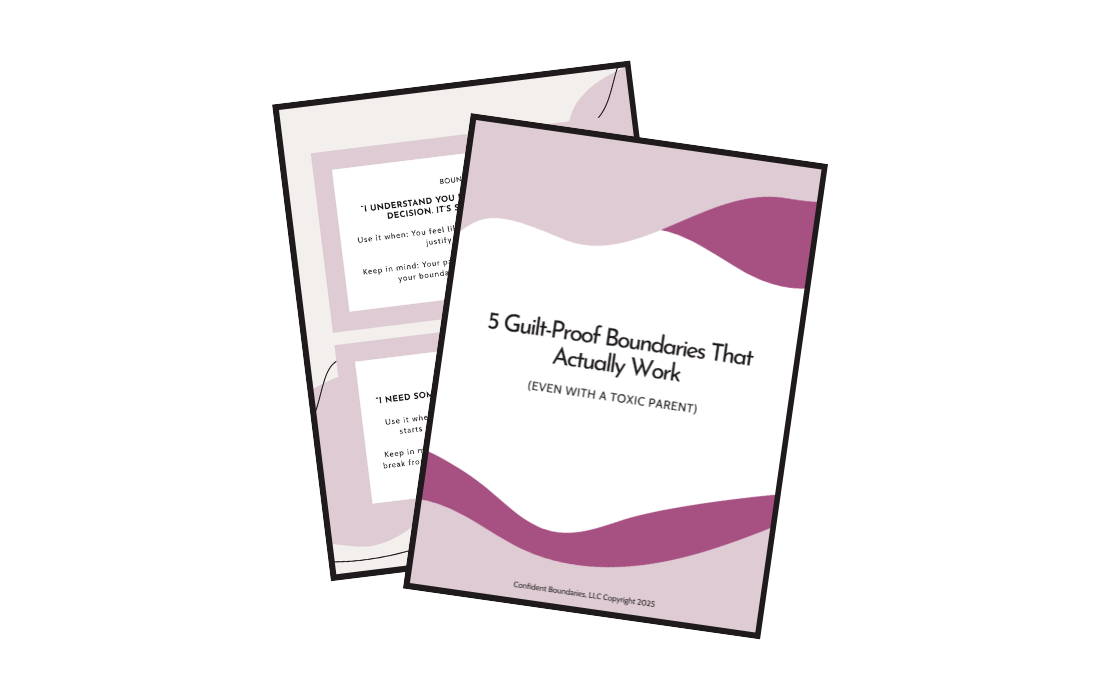
Taking Back Control: What to Do When Every Option Feels Terrible with a BPD or NPD Parent
When you’re the adult child of emotionally immature parents—especially ones with borderline or narcissistic traits—sometimes every option sucks.
You’ve tried setting boundaries… and been met with rage, guilt-tripping, or gaslighting.
You’ve considered going no contact… but the thought of the fallout (or the guilt) makes your stomach turn.
You’ve tried staying quiet, hoping things would get better… but the only thing that’s changed is how exhausted you are.
Sound familiar?
This is what it looks like when you’re dealing with a dysfunctional family system. And if you’ve been spinning your wheels trying to figure out the “right” thing to do, here’s your permission to stop:
You don’t need the perfect choice. You just need your next one.
When Every Path Forward Feels Wrong
A toxic parent—especially one with BPD or NPD—tends to create a no-win environment:
-
Speak up? You’re accused of being cruel.
-
Set boundaries? You’re punished or ignored.
-
Distance yourself? You’re labeled the ungrateful one.
So of course you feel paralyzed.
You were conditioned to believe that your well-being only matters if it doesn’t inconvenience anyone else.
But here’s the truth:
You’re not stuck because you’re weak—you’re stuck because you’ve only ever been given impossible options.
And that changes now.
5 Quick Tips for When You Feel Emotionally Trapped
When you’re in the middle of an emotional spiral or boundary battle, it’s easy to forget you have choices. So here are 5 trauma-informed, real-life strategies to help ground you:
1. Stay Present
Your nervous system might be telling you this moment = danger. Help your body calm down so you don't panic. Try grounding techniques: feel your feet on the floor. Breathe.
2. Use More Effective Language
Sometimes the words we use can escalate a conversation before it even begins. Try phrases like, “That doesn’t work for me,” or “I’m not available for that,” instead of using statements like, "you always do this."
3. Redirect Your Energy
You can’t fix your parent’s behavior. But you can take a walk, text a friend, do a journaling prompt, or sit in the sun. Reclaim your emotional bandwidth. It’s yours.
4. Set Realistic Expectations
Expecting your BPD/NPD parent to respond with empathy is a setup for heartbreak. Expect them to be who they’ve consistently shown you they are. That’s not pessimism—it’s self-protection.
5. Plan for the Fallout
Will there be pushback? Maybe. So plan for it. Who will you text? What will you say to yourself? What boundaries will you reinforce if the guilt-tripping starts? Having a plan helps you stay grounded in your truth.
Radical Acceptance: The Turning Point
Here’s the most freeing thing I can tell you:
Acceptance isn’t approval.
Radical acceptance doesn’t mean you’re okay with what’s happened. It means you’re done pretending that this person is someone they’re not.
It means letting go of the fantasy that if you just loved harder, explained better, tolerated more, they’d finally get it.
When you accept your parent’s limitations—not as a flaw in you, but as a reality of who they are—you take your power back.
You stop contorting yourself to earn love that was always conditional.
You Have More Power Than You Think
If you grew up with a narcissistic or borderline parent, your sense of power probably got buried under years of emotional manipulation.
But here’s the truth:
-
You can say no.
-
You can take space.
-
You can stop explaining yourself.
-
You can protect your peace—even if it disappoints them.
Their discomfort is not your responsibility. Your well-being is.
Healing Isn’t Linear—But It Is Worth It
You’re going to have days where you feel confident, and others where you question everything. That doesn’t mean you’re doing it wrong.
You might:
-
Take two steps forward and one back.
-
Feel fine until you get that text.
-
Set a boundary and then cry about it for a week.
That’s okay.
Healing from emotionally immature parents isn’t clean. But it’s real. And it’s yours.
You’re Not the Problem—You’re Breaking the Cycle
If you’ve been living in a loop of guilt, confusion, and paralyzed decision-making… I need you to hear this:
You are not the problem.
You are the one doing the courageous work of changing a pattern that existed long before you.
And even if your next step isn’t perfect—even if it feels terrifying—it’s yours.
And that matters.
Want More Support While You Navigate This?
Inside the Confident Boundaries Membership, we talk about all of it:
-
The stuckness
-
The boundary guilt
-
The grief of letting go of the fantasy
-
The practical tools for reclaiming your voice, your peace, and your life
If you’re dealing with toxic parents and every option feels like a trap, you don’t have to figure this out alone.
You’re Not Crazy.
But you might have been gaslit by your parents.
Learn how to recognize the signs—and start rebuilding trust in yourself.
I hate SPAM. I will never sell your information, for any reason.



